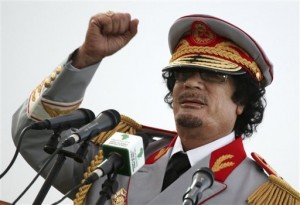Moammar Gadhafi’s death
World leaders hailed the death of former Libyan leader Moamer Gadhafi as the end of an era of violence and tyranny, and held out hope for a better future for the North African nation.
As Libyans fired automatic weapons into the air and danced for joy, U.S. President Barack Obama said the death of the man Thursday who had ruled the oil-rich country with an iron fist for 42 years ended a long, painful chapter.
“This is a momentous day in the history of Libya, the dark shadow of tyranny has been lifted” – Obama said, adding that Gadhafi’s demise vindicated the collective military action launched by the West.
Hours after Libya’s interim government, the National Transitional Council (NTC), announced Gadhafi’s death, Obama urged the country to look to the future and build a ‘democratic’ and ‘tolerant’ nation.
British Prime Minister David Cameron also welcomed a chance for Libya’s ‘democratic future’ as he remembered Gadhafi’s victims, including those who died in the 1988 bombing of a Pan Am jet over the Scottish town of Lockerbie.
French President Nicolas Sarkozy said the Libyan people had fought “to liberate themselves from the dictatorial and violent regime imposed on them for more than 40 years.”
French, U.S. and British forces spearheaded the NATO air campaign against Gadhafi’s military, which has launched nearly 1,000 strike sorties since March 31.
Speaking in Islamabad, Washington’s chief diplomat Hillary Clinton said it was “the start of a new era for the Libyan people” – a sentiment echoed in Beijing.
The burial of slain leader Muammar Gaddafi has been delayed until the circumstances of his death can be further examined and a decision is made about where to bury the body, Libyan officials said Friday, as the U.N. human rights office called for an investigation into his death.
The transitional leadership had said it would bury the dictator Friday in accordance with Islamic tradition. Bloody images of Gaddafi’s last moments in the hands of angry captors have raised questions over his treatment minutes before his death. One son (Muatassim) was also killed but the fate of Gaddafi’s one-time heir apparent Saif al-Islam was unclear.
Justice Minister Mohammed al-Alagi said Seif al-Islam was wounded and being held in a hospital in the city of Zlitan. But Information Minister Mahmoud Shammam on Friday that the son’s whereabouts were uncertain.
Shammam said Gaddafi’s body was still in Misrata, where it was taken after he was found in his hometown of Sirt, and revolutionary forces were discussing where it should be interred.
Thursday’s death of Gaddafi, two months after he was driven from power and into hiding, decisively buries the nearly 42-year regime that had turned the oil-rich country into an international pariah and his own personal fiefdom.
It also thrusts Libya into a new age in which its transitional leaders must overcome deep divisions and rebuild nearly all its institutions from scratch to achieve dreams of democracy.
Many Libyans awoke after a night of jubilant celebration and celebratory gunfire with hope for the future but also concern that their new rulers might repeat the mistakes of the past.
Khaled Almslaty, a 42-year-old clothing vendor in Tripoli, said he wished Gaddafi had been captured alive.
“But I believe he got what he deserved because if we prosecuted him for the smallest of his crimes, he would be punished by death” – he said. “Now we hope the NTC will accelerate the formation of a new government and … won’t waste time on irrelevant conflicts and competing for authority and positions.”
For decades, Libyan dictator Moammar Gadhafi was seen as an international villain, but for Susan Cohen he was a personal enemy, one she read up on daily for more than 20 years.
Her 20-year-old daughter was one of the 270 people (many of them New York and New Jersey residents) killed when Pam Am Flight 103 was blown out of the sky by a terrorist bomb over the Scottish town of Lockerbie on December 21, 1988, allegedly at Gadhafi’s behest.
“This was sort of like Dracula: Is Dracula really dead?” said Cohen, of New Jersey. “It’s great now that we know. I didn’t want him to go to a trial. When you have a tyrant, a monster like him, we’re all better off with him dead. Now there can be no illusion of him ever returning to power.”
She said she intended to celebrate his death with an expensive bottle of champagne.
Like the relatives of many of those killed on Flight 103, Cohen was an ordinary citizen who became an activist on Libya, terrorism, international law and diplomacy after the attack.
Some, like Cohen, even attended the trial in the Netherlands of Abdel Basset Ali al-Megrahi, who was convicted as the mastermind of the attack. They were outraged in 2009 when he was released to Libya from British captivity in 2009 on humanitarian grounds as he was supposedly close to death — and have remained angry that he’s still alive two years later.
To some of them, his return implied that Britain was siding more with Gadhafi than with the victims of the bombing. In London on Thursday, British Prime Minister David Cameron pledged assistance to Libya’s leaders as they work to form a new government.
“Today is a day to remember all of Gadhafi’s victims” – he said. “We should also remember the many, many people who died at the hands of this brutal dictator and his regime.”
Ali Aujali, the Libyan National Transitional Council’s ambassador to the U.S., told CNN that he didn’t think transitional leaders would want al-Megrahi returned to Scotland. “I saw the last photo of him. He is a very sick man” – Aujali said.
